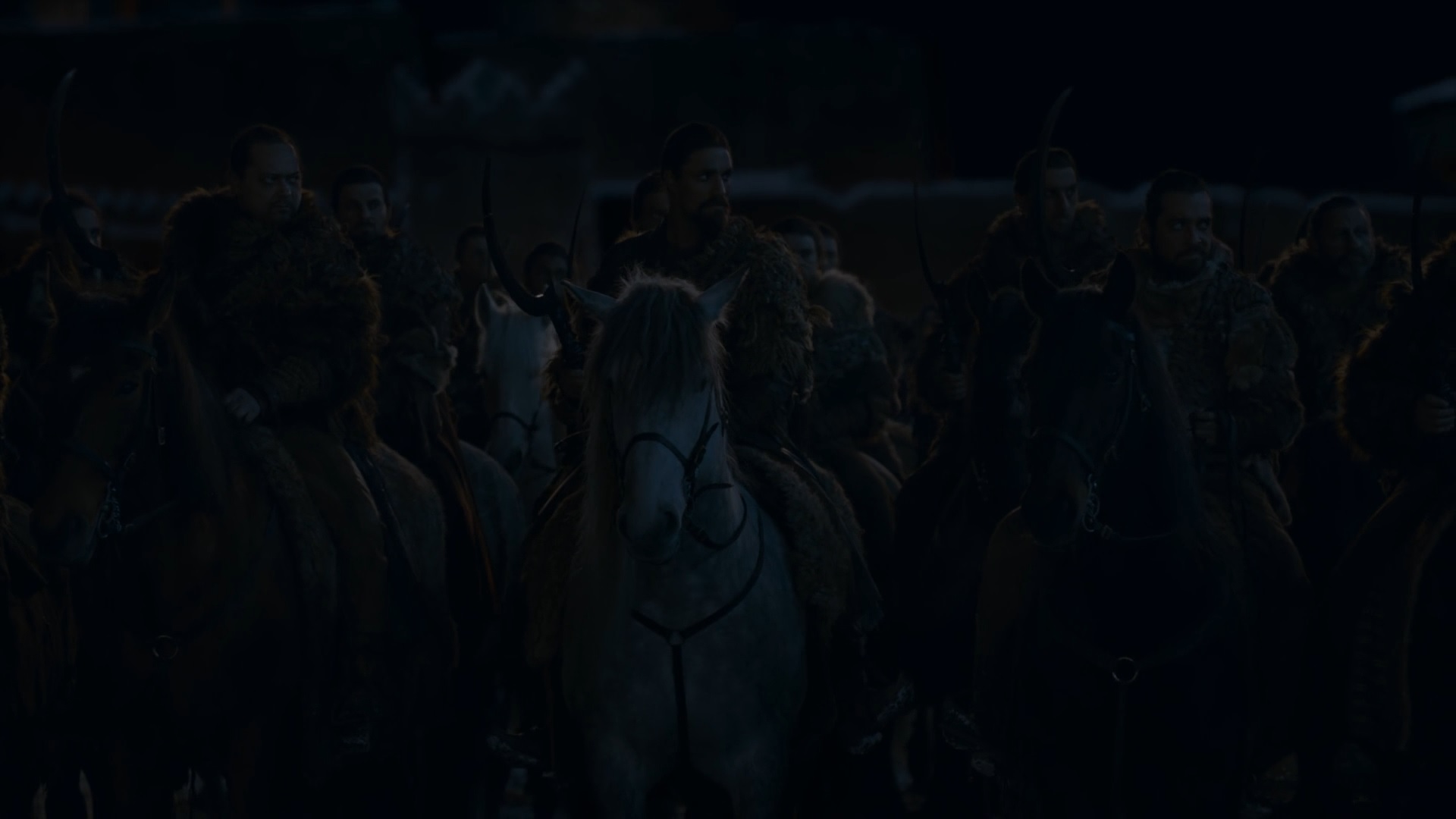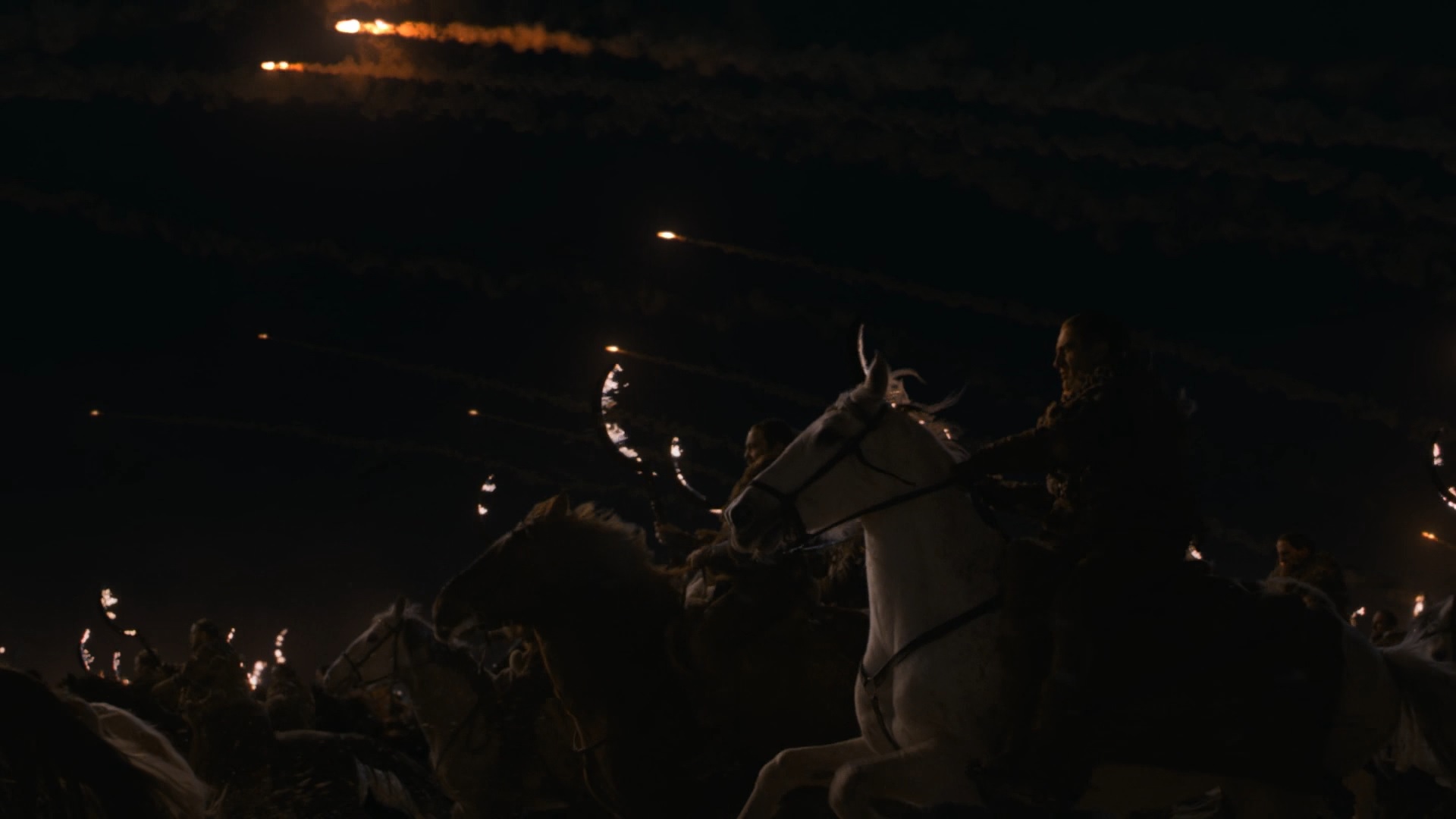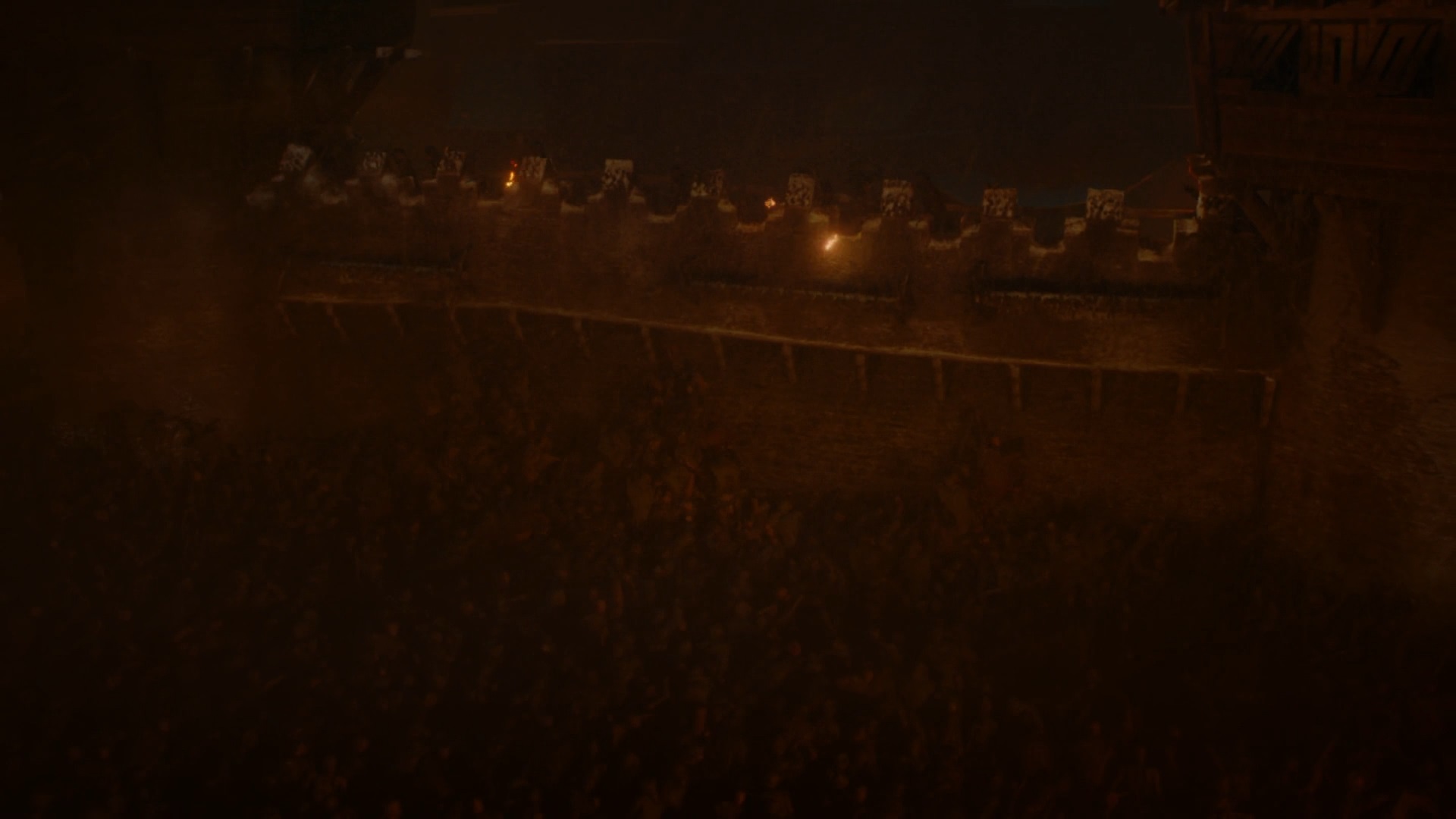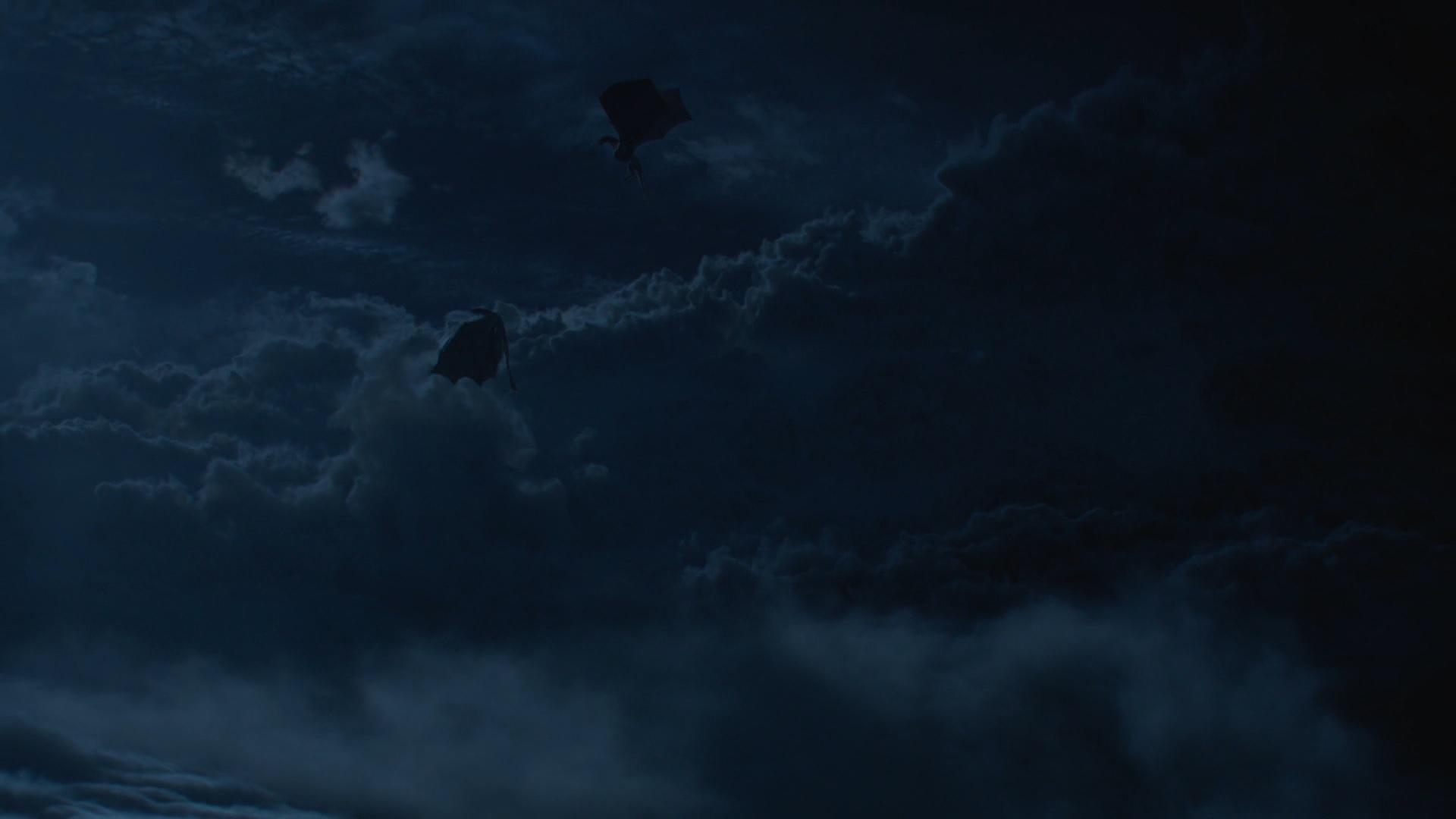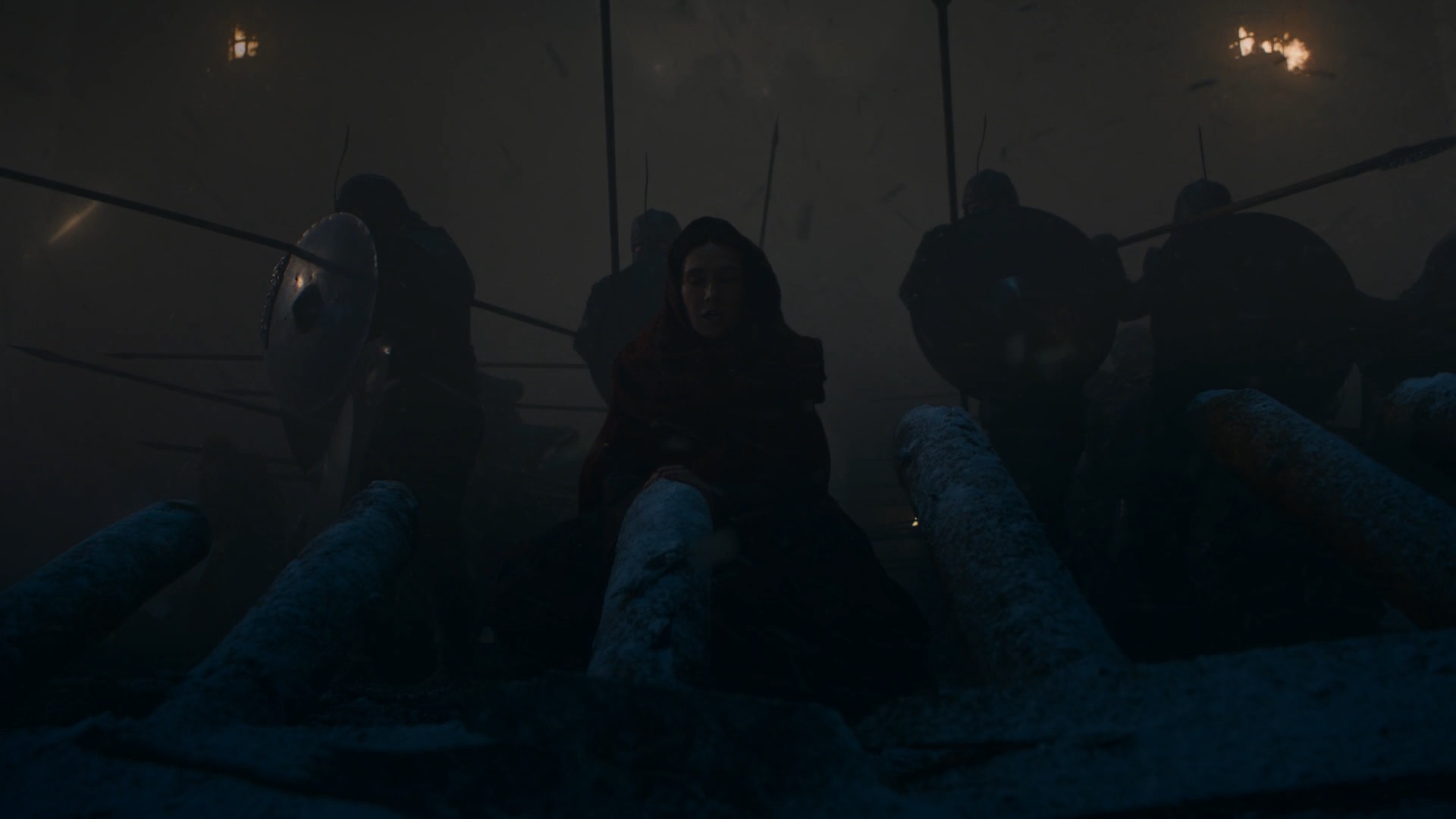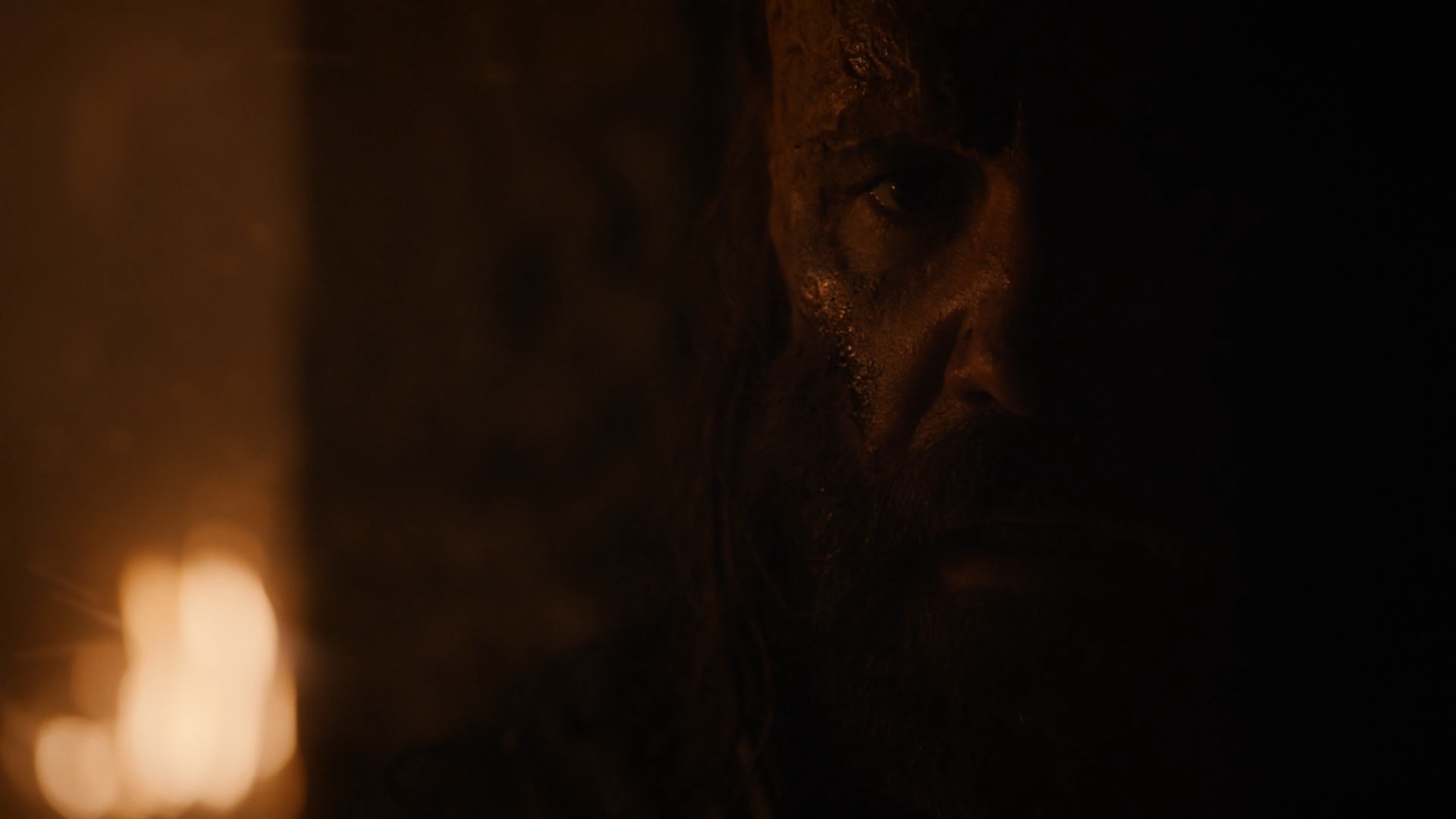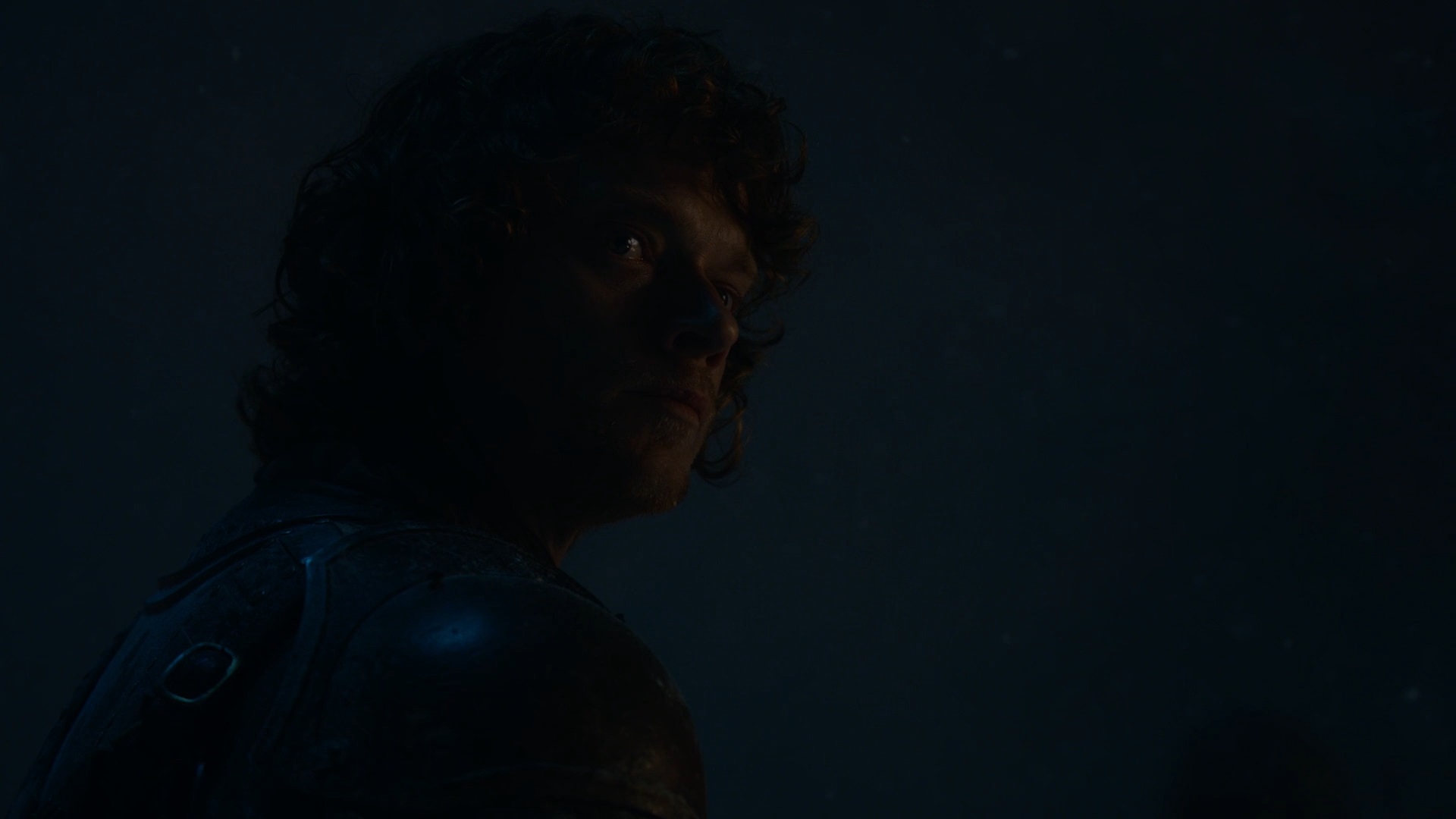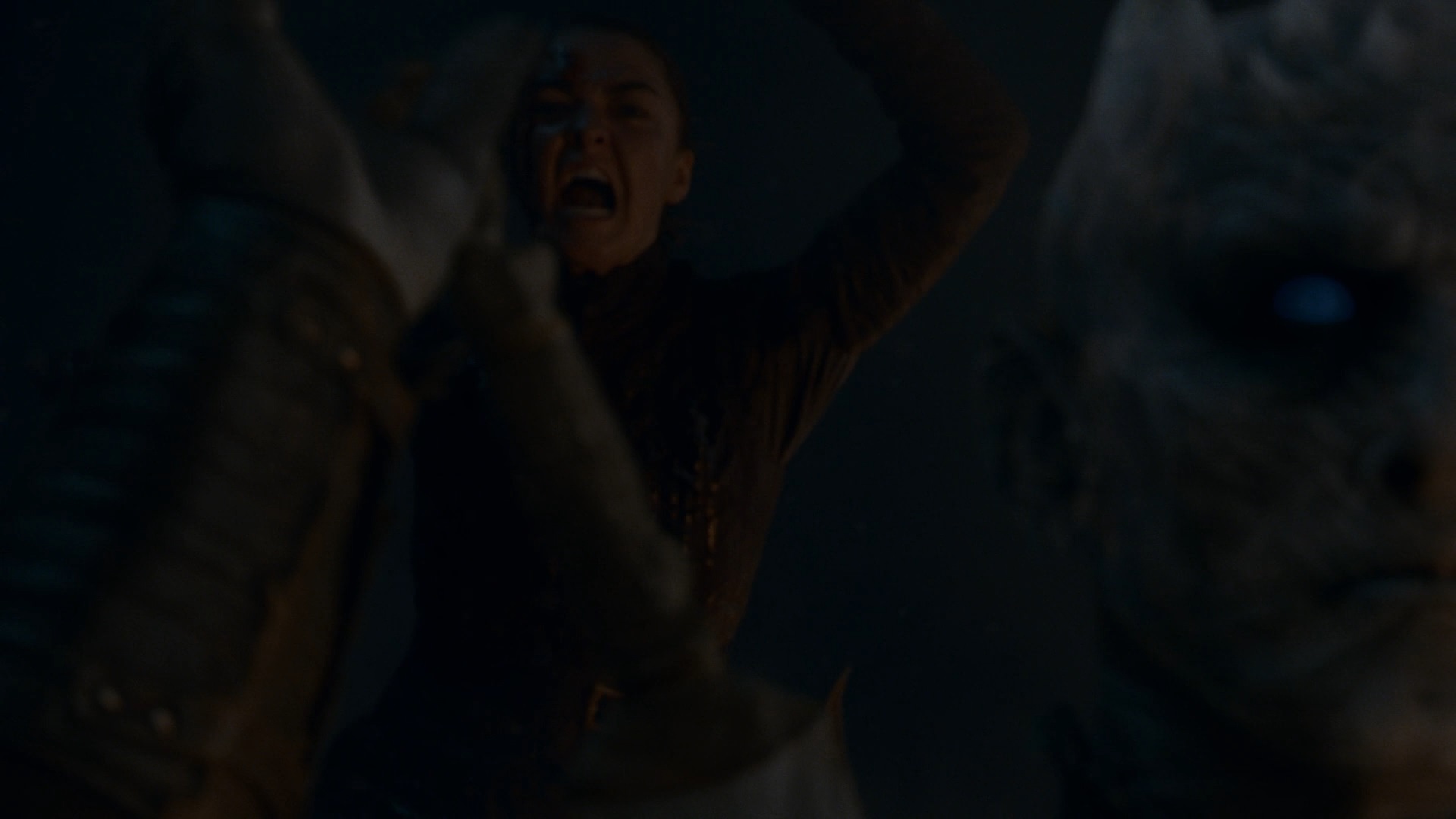But the Battle of Winterfell (episode title: The Long Night) which took 55 days to film, 750 people on set and has a runtime of 82 mins (the longest battle in film/television history), is a different beast entirely. It isn’t about spectacle. The cool moments are fleeting. There are no crowd-pleasing speeches and rallying cries that will make you want to charge into battle alongside Jon Snow and Ser Jorah the Andal. Some battles inspire you to be a warrior; some make you thank the old Gods and the new that you’re sitting on this side of your computer screen. The Battle of Winterfell is the latter, a clash of good and evil that will make Mel Gibson wince. It is dirty, grimy, unflinching and unforgiving. More importantly, it is about fear. It’s easy to see why Miguel Sapochnik was brought in to direct this episode. Time and time again, he has proven to be a master at helming these bigger episodes (Battle of the Bastards, Hardhome and of course Winds of Winter). But what separates him from say, someone like Peter Jackson is his ability to use silence as a powerful storytelling tool. He has a specific style, a strong voice and his work thus far on Game of Thrones has always felt like Shakespearean poetry come to life.
We start the episode with a long take, not following Jon Snow or Jamie Lannister or any of the brave young warriors, but Samwell Tarly whose hands are quivering thinking about what’s to come. Next we see Tyrion, the smallest man on the show. He takes a big gulp of wine from his flask wondering (I think), if there’s more for him to do than sit in the crypts of Winterfell. The music is sombre and almost quiet as we see thousands of people lined up — the Unsullied (led by Grey Worm), the Dothraki (led by Ser Jorah), Jamie Lannister, The Hound, Brienne of Tarth, Gendry, Podrick, and basically every single able-bodied man and woman who have pledged themselves to fight for the living, all of whom stare into the darkness and unknown. The black of night is broken by the Red Woman who rides in, chants a prayer and ignites all the curved blades of the Dothraki screamers. Ramin Djawadi’s music changes, from still to stirring. The horde screams and charges into the black. We see great balls of fire soaring above them catapulted from the castle, in the first of many gorgeously photographed scenes by Fabian Wagner. It’s glorious! Our spirits rise, ready for the great war of epic proportions. Except from a distance, we see the lights of the Dothraki slowly extinguish like fireflies during the logging of rain forests until it’s complete darkness again; complete silence again. Some of them manage to retreat, like Ser Jorah who has a look of defeat and failure plastered on his face. He’s scared and so are we.
These opening sequences lay the groundwork for what’s to come. It’s not about strategy — take all your plans and throw it out the window. This isn’t going to be a chess game nor a glorious clash. This is horror and gods be good, our heroes survive. Thousands upon thousands of wights attack. Jon and Dany mount the dragons and start lighting them all up. The Night King creates a snowstorm that will bring back memories of Mad Max: Fury Road, that engulfs the dragon. Fabian Wagner’s cinematography is marvellous (later in the episode you see a beautiful wide shot of Drogon and Rhaegal above the clouds), but there’s also purposeful messiness to Sapochnik’s direction, as the two dragons collide, almost knocking Dany off. In fact, a large majority of the episode is chaotic. There’s a constant feeling of disorientation and tightness as characters are constantly dogpiled by the non-stop barrage of wights. The darkness of the episode adds to the feeling of disorientation. At one point we see Sam on the ground, almost ripped to pieces. He’s saved by Edd in the nick of time, who then gets a sword through his neck. In another scene we see Jamie and Brianne covered in blood and sweat and dirt retreat into the castle with hundreds of soldiers.
This is an atmospheric episode through and through. I felt the coldness in the air seep out of the screen and flood my room, as the hair on the back of my neck stood erect. Later we see the redness of the smoke and ash particles falling down like snow. You feel the heat. The horror-nature of the episode cannot be understated. The Battle of Winterfell comes with one of the most terrifying, pure horror sequences I’ve seen all year, as we see Arya who’s riddled with fear tiptoe around the Winterfell library, taking cover behind shelves and underneath tables. There aren’t any jumpscares, instead, the scene is filled with raw unbending tension and unrelenting suspense that kept me on the edge of my seat, heart pounding so hard and so fast. Heading into the episode, I wondered if Sapochnik would craft a sequence that’s similar to the elegant and elegiac opening nine minutes of Winds of Winter where Cersei blows the Sept of Baelor to hell. He does. The final moments of the episode that starts at the Crypts with Sansa and Tyrion holding hands (a heart-melting moment) and builds towards the defeat of the Night King is poetry in motion. Sapochnik drains out most of the sound and dialogue, allowing Ramin Djawadi’s wonderfully composed eerie music aptly titled ‘Night King’ to play out for eight minutes without interruption. Just thinking about it sends shivers down my spine.
Most great battle sequences are known for their action choreography, scale and sweeping shots. Not many pay close attention to the tiny reactions of the characters at crucial moments. But Miguel Sapochnik understands — just like Jordan Peele understood with Us — that sometimes, the human reaction to something terrifying can be just as uncomfortable as the terror itself. He keeps us on edge by using close-ups or simply lingering on a character. When Sansa enters the crypts, everyone looks to her for hope and inspiration, but the lady of Winterfell wreaks of nothing but defeat, understandably so. Our heart’s sink, just like Tyrion, Varys, Missandei and the women and children down there. But her look wasn’t that of a coward, but of a pragmatist. In another scene, Grey Worm’s look of dread fills the frame as he sees his Unsullied being pushed back by the army of the dead.
And then there’s the Red Woman Melisandre. Carice van Houten’s performance as the Red Priestess has been satisfying throughout. But here, she’s nothing short of exemplary, delivering her most nuanced and subtle performance in a layered character moment. The Unsullied form a barricade around Melisandre, who approaches the trench like a boss. She prays to the Lord of Light, but the trench doesn’t light up. The wights approach. She keeps chanting. Her confidence slowly subsides. You see genuine fear in her eyes, fear that almost turns to defeat. Her shattered confidence affects the tempo of her chants which become inconsistent. There’s a vulnerability in her voice, as prayer turns to pleads and finally, the trench lights up. If you watch Game of Thrones for its epic battles, then perhaps you’re watching the wrong show. The grand scope has always been the cherry, it’s the characters that make up the cake. And this episode is no different. What it does brilliantly, is intercut the unadulterated chaos with poignant character moments either big or small. Arya, who senses fear in her older sister, tells her to head to the crypts. In a fun little callback to season 1, Arya passes Sansa a dagger made of dragonglass and tells her to “stick em with the pointy end.” We don’t get much of the likes of Brianne, Jamie and Varys this episode, as far as character development is concerned. Their story will continue in the next chapter, when the series shifts its focus back to the Mad Lannister Queen and the Iron Throne. (They still get some moments to shine, though, respectively as courageous fighters on the field of battle and a man of wits in the Crypts.) But we do get wonderfully penned arcs involving a lot of other characters. One of which is The Hound.
When the series started, The Hound was a heartless and cold angry man who would kill mercilessly. But his travels with Arya changed him, just as it did Arya. Arya learned to be a little bit ruthless, while the Hound grew warmer. Season 8 has repeatedly hit home this point. In episode 1, The Hound calls Arya a “cold little bitch” which is as big a compliment you’ll get from Sandor Clegane as any. Arya and the Hound also share a sweet moment on the roof in episode 2. Here, the transformation of The Hound reaches its completion. When the area surrounding the castle goes up in flames and our heroes are being pushed back by the ruthless and untiring Wights, The Hound cowers. He pants and panics, on the verge of giving up. (This isn’t an out of character moment. Remember, The Hound ditches the Battle of Blackwater to save himself.) It’s only when Beric points towards Arya who’s fighting for her life, does The Hound pick himself up and charge into battle once more. The Hound goes from selfish to completely selfless, willing to put his neck on the line to save Arya’s. (Right before this, there’s a great moment where Arya takes on dozens of Wights while a version of the Valar Morghulis score accompanies the action.) Theon has been one of the most well written, complex characters of the series — right up there with Jamie. The young Ironborn has always been a lost soul in search of his identity. He was essentially taken by the Starks as a prisoner at a very young age but was raised as one of them. Ned Stark treated him like his own flesh and blood and the Stark siblings have always seen him as a brother. But on his journey towards finding himself and reconnecting with his roots, he made grave errors. He betrayed Robb Stark and sacked Winterfell. He hit rock bottom when the psychotic asshole Ramsay Bolton tortured, mutilated and brainwashed him.
Since then Theon has been on a long journey towards redemption. A journey that has led him towards this moment, right here, standing in between Brandon Stark and the Night King. In one of the episode’s most beautiful moment, Bran (in his own Three-Eyed Raven way) tells Theon that he’s cleansed of his sins and that he’s right where he belongs: home. A delicate yet powerful scene that had me in tears. Theon then gets a hero’s death as he single-handedly charges towards the Night King in an effort to protect his younger brother. He dies, but not before gaining the utmost respect of all us watching at home. What is dead may never die. Rest in Peace Theon Greyjoy/Stark. Ser Jorah Mormont gets a poetic closure too, giving his final breath away to protect the woman he’s loved with all his heart throughout the story. Now comes the most interesting plot point of the episode. The big twist. When the Red Woman first enters the castle early on in the episode, she looks Arya dead in the eye for more than a second. She knows something we don’t. Later, as Arya is chased by a horde of Wights, Beric Dondarrion — who has been resurrected from the dead by the Lord of Light many, many times — sacrifices himself in an effort to save the youngest of the Stark daughters. Throughout our journey following Beric, we’ve learnt that the Lord of Light has kept him alive for a specific purpose — a purpose that was unbeknownst to him and us: Save Arya. The question is… why? At this point, the ever so fearless Arya has started to fear death after almost getting ripped apart by the Wights. What we then get, is a brilliant and unexpected callback that took me completely by surprise. In an exchange with the Red Woman, Arya says, “you said I’d shut many eyes. You were right about that.” To which the Red Woman replies, “brown eyes, green eyes… and blue eyes.” The very same line she told Arya all those seasons ago. My jaw dropped to the ground with a thud! Could it be?! No way! As we hear the Wights banging on the door, the Red Woman says Syrio Forel (Arya’s dancing master from season 1)’s famous line: Arya dashes off! And in one of the most exhilarating sequences in the history of fantasy cinema, Arya stabs the Night King with her Valyrian Steel dagger right as he was about to kill Bran under the Weirwood tree, ending the Great War. Arya has been my absolute favourite character since season 2. She spent years on the run, away from family and a place she can call home, nearly escaping death and captivity many many times. Her training with the Faceless Man was brutal — I remember my soul being crushed when the Many-Faced God turned her blind. But all of that, all the training and hardship has made her the brilliant stealth assassin that she is today. So, when she used the same dagger trick she does when she sparred with Brianne, you can bet your ass I jumped out of my seat and squealed like a little kid. ARYA STARK, Slayer of Night King! “Not today.” What’s interesting is that the dagger — the very same dagger that was used in an attempt to assassinate Bran — was given to her by Bran in Season 7 under the very same Weirwood tree. The Three-Eyed Raven knew exactly what was coming. Incredible foreshadowing by the writers of Game of Thrones.
The Battle of Winterfell is one of the greatest battles ever put to screen for many reasons, most of it I’ve already talked about above. But it’s also great because in true Game of Thrones fashion it managed to subvert all our expectations (one of the reasons why I love The Last Jedi so much). Who would’ve guessed that Arya would be the one to kill the Night King? Does that mean that it’s Arya and not Jon/Dany who’s Azor Ahai? It’s possible. The Azor Ahai is said to be reborn and put an end to darkness. Jon was literally brought back to life by the Lord of Light. But Dany and Arya have gone through metaphorical rebirths of their own — Dany when she walked into the flames and came out the Mother of Dragons; Arya when she underwent training with the Faceless Man. Or maybe Azor Ahai is a combination of all three of them? You’ll never know with these prophecies and interpretations — Melisandre is proof. (An article for another day.) I love how a lot of what we theorised didn’t actually become a reality. Could Dragonfire kill the Night King? Bran wasn’t certain last episode. The answer is a resounding no. Drogon scorches the Night King with all his might and the Night King just looks up to Dany and smirks (the first time the Night King has shown any kinda emotion). A lot of us thought there was going to be a one on one battle between Jon Snow and the Night King because that would be cool and epic. But the Night King isn’t interested in any of that. He has no emotions or ego, only a singular purpose. So when Jon charges at him like the hero that he is (a callback to Battle of the Bastards), Valyrian steel sword raised, the Night King simply raises more dead, which goes on to surround Jon. Aegon Targaryen, sixth of his name would’ve died if his aunt and Drogon didn’t come to his rescue, just like how he would’ve died if Sansa did not bring the knight’s of the Vale during the Battle of the Bastards. Perhaps the biggest subversion of them all is that not that many major characters died as we confidently predicted. We lost Lyanna Mormont (who went out like a champ, taking out a giant), Dolorous Edd, Beric Dondarrion, Theon Geryjoy, Jorah Mormont and Melisandre (who allowed herself to rest after fulfilling her destiny). But the likes of Tormund, Grey Worm, Gendry and Ser Davos who most of us were confident would surely die, all live to see another day. Man, what a brilliant episode from start to finish. What a GREAT battle from start to finish.
